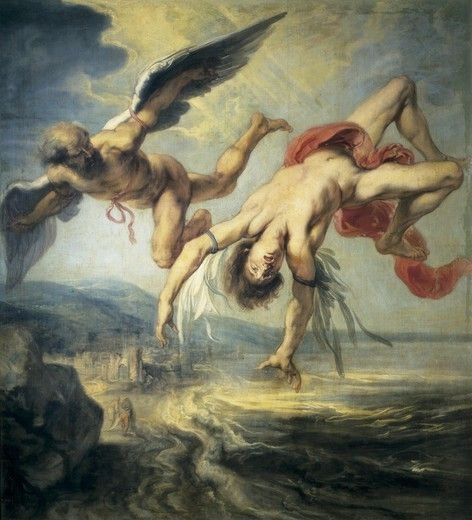Headmaster Brennan On Icarus, Adolescence, and the Importance of Mentors
On 3 April, Headmaster Kerry Brennan welcomed students and faculty back from R.L.’s March break, thus launching the 2018 spring term, and reminding all that our remaining school days with Class I counterparts numbered only 12. Headmaster Brennan set the tone, and the morning’s theme, with a retelling of the myth of Daedalus and Icarus, taken from William Bennett’s The Book of Virtues. He called to mind a famous oil painting titled “The Fall of Icarus” by the Flemish painter Jacob Peter Gowy, which hangs in the Prado Museum in Madrid—a site familiar to those R.L. boys who have partaken in the annual immersion trip to Spain.
As the myth goes, Daedalus—the genius inventor and father to Icarus—conceives of a way for he and his son to escape the imprisonment imposed by King Minos, by developing wings—made of gull feathers and wax—and teaching his son how to ride the wind currents. Icarus, not heeding his father’s warning against the thrill of flying too high where the sun would melt the wax, falls to his death.
“First, I would like to think about what went wrong in this story,” said Headmaster Brennan. “Daedalus not only fashioned a means of escape for he and his son, but he also anticipated what might go wrong. He admonished Icarus ‘not to go too high, and not to go too low.’ In effect, Daedalus was lobbying for moderation, for pursuing a safe path, for avoiding risks that would surely accompany extremes.”
Headmaster Brennan tied the experience to modern-day temptations that adolescent boys face: the pulls of the internet and social media, the rush of driving at irresponsible speeds, the presence of drugs or alcohol at a party, the allure of racking up college acceptances for bragging rights. He then urged students to connect with adults—beyond their parents—who might offer experience, wisdom, guidance, and sound advice: mentors.
“A mentor teaches, but indeed does more than that,” said Mr. Brennan. “The mentor lives a life and helps the mentee to live a life that is meaningful and virtuous. The best mentors I know do not seek to impose their own life journeys on their mentees, but they do freely share lessons they have learned… Throughout literature and films we encounter older, wiser, invested characters who teach and inspire and matter to younger mentees. Think of Merlin and the young Arthur, or the Fairy Godmother and Cinderella, or Alfred the Butler and Batman, or even Yoda and Luke Skywalker, or perhaps most vividly Mr. Miyagi and the Karate Kid.
“A mentor has a different investment in a mentee than a parent has in a child. For starters, the mentor and mentee choose each other… A good mentor is analytical and not judgmental. A good mentor offers inspiration as well as guidance and training. Their relationship is based on free and open communication and is always character based and not about some particular competency. A good mentor is always available—if not at that minute, at least shortly, eager always to be of help, to lend an ear, to affirm.”
You can view Mr. Brennan’s Opening of Spring Term Hall talk below, in its entirety.

